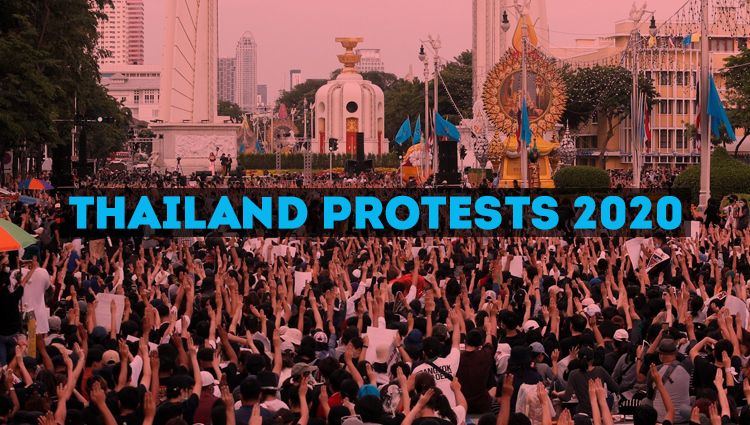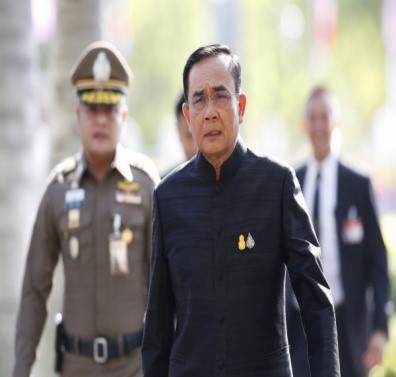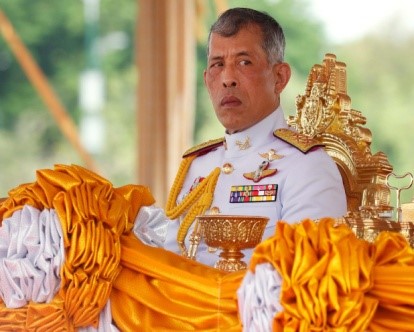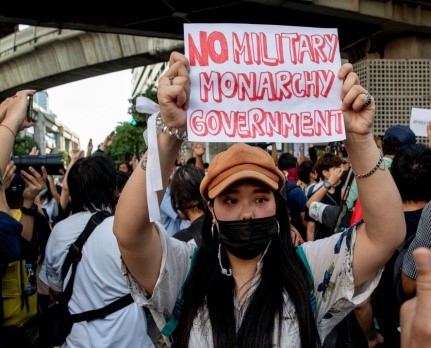
THAILAND PROTESTS 2020
THAILAND PROTESTS 2020

In Thailand, protests have been ongoing against the government of Prime Minister Prayut Chan-o-cha, which have included demands for reform of the Thai monarchy, unprecedented in the contemporary era. The protests were initially triggered by the dissolution of the Future Forward Party (FFP) in late February 2020. The party was critical of Prayut and the country's political landscape designed by the current 2017 constitution. The protesters are mostly students and young people without an overall leader.
BACKGROUND OF THE PROTEST
Initially, the government allowed peaceful and lawful protests but now stringent control, due to anarchy in protests. The roots of the current discontentment go back to the 2014 coup which brought the junta (military dictatorship) in power which tightened its grip on power and introduced more and more restrictions on the public. In 2017, the military introduced a new Constitution, which allowed the military to appoint a 250-member Senate that would play a role in selecting the Prime Minister. The country held the delayed Parliamentary election in 2019, which was seen as a mere exercise to transfer power from the junta to an elected government. Thailand’s royal family has considerable influence over the country’s political system and is revered by citizens. Many, particularly young Thais, have increasingly started questioning the monarchy’s role, its privileges, and the power it has exerted in the country for years.
WAVES OF PROTEST AND THE PROTESTERS
The first wave protests were triggered by the Constitution Court decision to disband the FFP on 23 February 2020. Demonstrations since erupted in various high schools, colleges, and universities nationwide. These student-organized protests also came with various hash tags unique to their institutions. The protests, however, were limited to individual institutions. A Thai historian scholar noted that street protests have never created political changes if the military sided with the government. The protests, which were organized exclusively on the academia grounds, were halted in late February due to the COVID-19 pandemic.
On 18 July, Thailand saw the largest street demonstration since the 2014 Thai coup d'état at the Democracy Monument in Bangkok with around 2,500 protesters. The protesters, organised under the name Free Youth announced the three core demands, which include: dissolution of the House, ending intimidation of the people and drafting a new constitution. A Free Youth leader stated that they do not aim to overthrow the monarchy. The gathering was planned to last overnight, but it was cancelled by midnight for security reasons. After 18 July, the protests soon spread across the country. The first were in Chiang Mai province and Ubon Ratchathani Province on 19 July. By 23 July, demonstrations had been organized in more than 20 provinces. Most of the protestors are students and young people in their 20s.
DEMANDS OF THE PROTESTERS

Protesters also seek the scrapping of “Lese Majeste laws”. The monarchy is protected by Section 112 of the Penal Code, which says whoever defames, insults or threatens the king, queen, heir-apparent or regent shall be jailed for three to 15 years. This law has remained virtually unchanged since the creation of the country's first criminal code in 1908, although the penalty was toughened in 1976.
Students submitted 10 demands to the government, asking for a separation of the King’s assets and the Crown Property Bureau (quasi-government institution to manage the monarch's property in Thailand).They also wanted to cut the Palace’s share in the national budget, a ban on the King from expressing his political views, and safeguards to prevent him from endorsing future coups. Some protesters want to reverse a 2017 increase in the king’s constitutional powers, made the year after he succeeded his widely revered late father King Bhumibol Adulyadej.
Pro-democracy activists say that Thailand is backtracking on the constitutional monarchy established when absolute royal rule ended in 1932. Also, the monarchy is too close to the army and argues that this has undermined democracy.
Other Demands: The students have also called for the Prime Minister’s resignation; a new Constitution; fresh, free and fair elections; and an end to attacks on dissidents and opposition parties such as the Future Forward Party.
CONSEQUENCES OF THE PROTESTS

The state has attempted to severely restrict online freedom of speech. On 24 August, in response to a Thai government order, Facebook blocked access in Thailand to the million-member main Facebook page critical of the monarchy, Royalist Marketplace. Facebook is challenging the order in the courts. A Thai media provider was reported to be censoring a foreign news network reporting the protests.
A severe state of emergency was declared in Bangkok during 15–22 October, during which the police moved to ban or block anti-government or independent media, together with the Free Youth Facebook page, and seized books criticizing the monarchy. Ministry of Digital Economy and Society stated it intended to prosecute internet service providers and online platforms which allows prohibited content, and reported about 320,000 illegal messages. In response, several Thai press associations issued a joint statement opposing suppression of the media. The authorities also required foreign diplomats to obtain advance permission to observe protests.
The King and the palace initially did not express any public opinion about the protests. In August, a government official stated that the King was not bothered by the 'children's' protests, but an article reported that the Thai monarchy has asked Thai media to censor mention of the ten demands.
QUESTION (1-5)
Q.1 In Thailand, the protests have been ongoing against the government of which of the following Prime Ministers?
A. Prawit Wongsuwan
B. Prayut Chan-o-cha: ANSWER
C. Thaksin Shinawatra
D. None of the above
Q.2 Which of the following political parties of Thailand was banned which has triggered the protesters?
A. Move Forward Party
B. Pheu Thai Party
C. Future Forward Party: ANSWER
D. Thai Liberal Party
Q.3 The Siamese Revolution which had turned the Absolute monarchy to the Constitutional Monarchy happened in which of the following years?
A. 1932: ANSWER
B. 1936
C. 1955
D. 1972
Q.4 Which of the following is/are true about the demands of the protesters who are protesting in Thailand?
A. They seek scrapping of lese majeste laws.
B. Protesters called for PM Prayut Chan-o-cha's resignation
C. Protesters wanted to cut the palace's share in the National budget
D. All of the above: ANSWER
Q.5 India & Thailand shares good relationship on strategic level & they both are the members of which of the following organizations?
A. ASEAN
B. BIMSTEC
C. SAARC
D. Both A & B: ANSWER












0 Comment